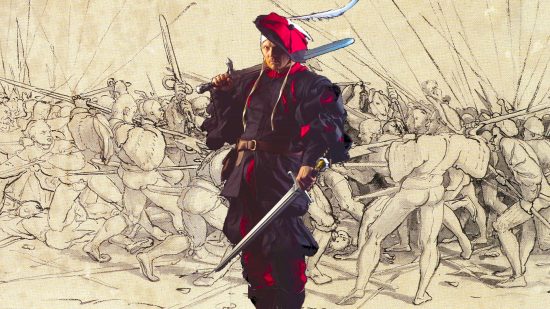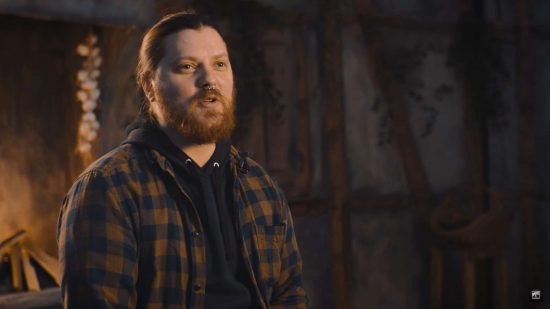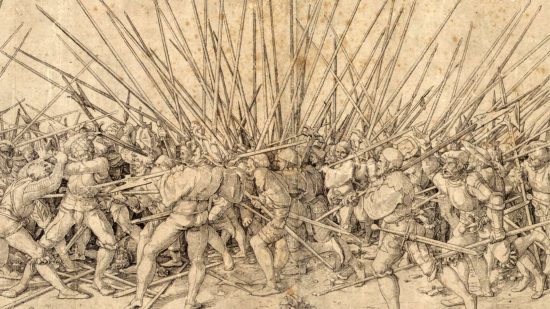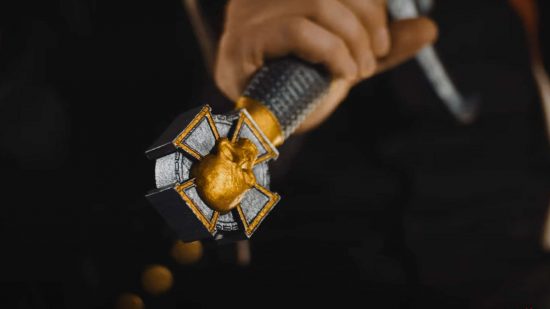The creative team at clothing makers Burgschneider used techniques it honed creating historical re-enactment gear to make the firm’s new line of official Warhammer cosplay clothing and LARP gear, ‘Warhammer Armoury’. Chief Creative Officer Beol Miller explains the firm’s process in an interview with Wargamer.
The first set of clothing from the Warhammer Armoury line was revealed on March 4, two swords and a uniform for an Empire of Man trooper from the city-state of Nuln. Miller explains that the Burgschneider creatives approach the Warhammer: The Old World setting in much the same way they would approach a historical period.
The design phase for any garment, weapon, or piece of armor starts with fact finding and source material review. Unlike a historical piece, when Burgschneider works on a licensed property “this isn’t going to be archaeological material, it isn’t going to be material coming from experimental archaeology”, but it is “going to be coming from things like books and art that sometimes can be almost as big”.
As the The Old World is set earlier in the game’s history than previous editions of Warhammer, elements of design and iconography for each of the Old World factions have subtly changed. “Who is killing who and why is a great conversation because it changes minutia”, Miller says. “Say there’s an element on a flag that represents a specific moment from the era of Karl Franz where he made an alliance, that little symbol” simply wouldn’t exist during the time period of The Old World
After reviewing the Warhammer source material, the team at Burgschneider delves even deeper. “We try to understand, where is the source material coming from?”. “In the case of the Empire of Man, you’re looking at a lot of Landsknecht period pieces.” The Landsknecht were 15th and 16th century German mercenaries who wore iconic puffed sleeves and trousers, massive feathered hats, and padded codpieces.
“You’d be amazed how many [Warhammer] things are just spot on with this historic grounding”, Miller says. The first ever Empire miniatures were sculpted by the Perry twins, who specialised in historical miniatures and have since founded a business selling historical models, so it’s perhaps unsurprising that the match is so close.
While the patterns for making some historic garments are well understood, identifying exactly what is an original component and what is a Warhammer invention is critical to getting things right for the Warhammer garments.

“In the process of trying to understand micro elements of how we want to construct these garments, we use some of the great material from places like the Kunsthistorich Museum in Vienna or the Met in NY”, which have “fantastic collections of arms and armor”, plus sources like the woodblock prints of Landscknechts by Hans Holbein the Elder and Hans Holbein the younger.
Once the research is done, “we go into the technical drawing phase, in which we outline and draw the main elements of the garment or the armor”. For early prototyping “we use a programme called CLO 3d which takes patterns and drapes them over a 3d model”. While this digital technology allows Burgschneider “to be iterative and to work faster than would be possible” with traditional methods, Miller says “you still need to have those traditional skills to be able to build the patterns”.
Burgschneider’s philosophy when creating a garment based on a historic period or fantasy world is to “capture its form and style without recreating the specific elements of the design that cause it to be extremely expensive”. “Hand spun wool” might be more authentic than machine spun, but the cost means Burgschneider won’t ever use it in its designs.
Burgschneider also uses modern materials and manufacturing to make garments that “allow for a certain level of flexibility with body shapes, meaning that we’re going to be able to release clothes from small to triple XL in size”. Historical clothing would be tailored to the wearer, but a variety of off-the-peg sizes with a little give is more convenient and affordable for the “entry level to mid level” customer.
Miller is effusive about the working relationship with Games Workshop, which now has a dedicated licensing team to ensure companies respect its IP in licensed products. “The entire team at Games Workshop has been unbelievably supportive”, Miller says, adding “we have very regular back and forth conversations about even small things”.
He hints “we recently had a discussion about an upcoming LARP safe weapon that we’re going to be putting into the line, and we got into a long conversation about how the leather wrap is done on the handle, really talking about the granularity of these elements”.
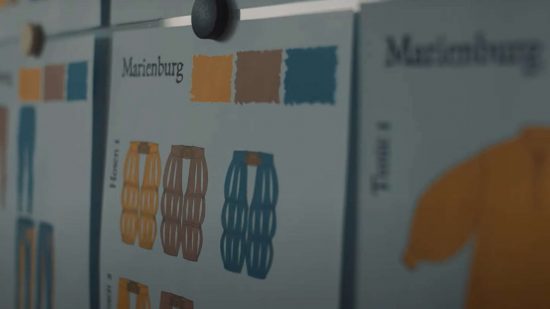
Miller isn’t saying what that is, but we have to speculate that a Warhammer LARP line centering on the Empire wouldn’t be complete without the Warhammer, Ghal Maraz. Though a LARP safe lance from Bretonnia would be one hell of a flex.
As for what will be revealed next, Miller can’t say. Looking over the reveal video for the range when writing this article, Wargamer noticed a hint hidden in plain sight – it seems that the team is working on garments for the wealthy city-state of Marienburg.
We haven’t had time to mention it, but if you’re a fantasy LARPer or a DnD cosplayer, Burgschneider also has a range of licensed DnD garments, which now covers all the core DnD classes. We’ll be keeping an eye on all their releases to see what they make next.
Warhammer: The Old World fans, make sure you check out the Old World Dwarf reveals from Adepticon – we can’t be far from the Empire models being re-released, surely?
